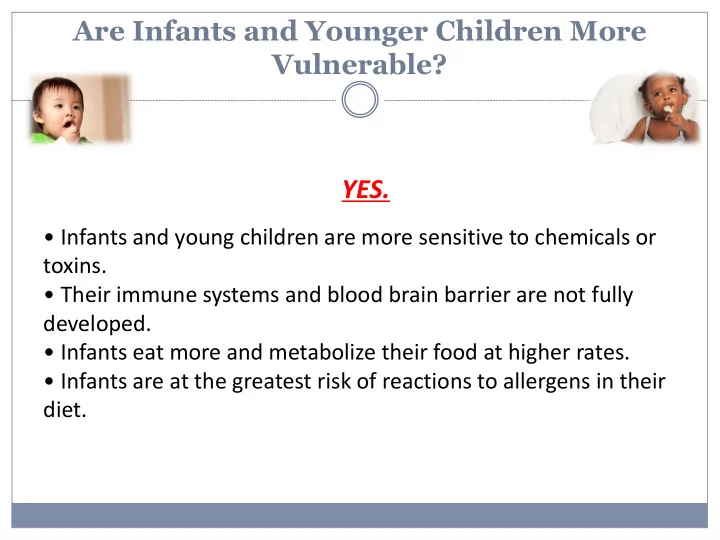

Are Infants and Younger Children More Vulnerable? YES. • Infants and young children are more sensitive to chemicals or toxins. • Their immune systems and blood brain barrier are not fully developed. • Infants eat more and metabolize their food at higher rates. • Infants are at the greatest risk of reactions to allergens in their diet.
Are GMOs in Infant Formula and Baby Food? YES. An independent laboratory tested four infant soy based formulas and they were full of GMOs. • Enfamil ProSoybee contained 49% GMOs. • Similac Soy had 42% GMOs. • Walmart Soy contained 66% GMOs. • Gerber Good Start Soy had 48% GMOs. •Also contains GM corn, and milk from cows injected with GM bovine growth hormone. The only way to avoid GMOs in infant formula and most baby food is to buy organic.
Is There Current Research? YES. A recent study conducted by University of Sherbrooke Hospital Centre in Quebec, Canada found Bt toxin from genetically modified organisms in 93 percent of pregnant women and in 80 percent of umbilical cords tested.
A Pediatrician’s Thoughts…. “What is particularly frightening is that the science used in producing these GMO foods is extremely imprecise and new proteins are being formed that the human has not yet been exposed to. I believe this may be responsible in part for the profound increase in allergies and immune dysfunction that I am witnessing.” —Dr. Michelle Perro, MD, Pediatrician, Fairfax, CA
Physicians Perspective “Over the past 20 years there has been an almost logarithmic increase in a whole series of chronic illnesses – things like asthma, autism, Parkinson’s, various types of cancer. These things are multi-factorial but certainly it does coincide with introduction of GMO food . . . . I’m very concerned that they are contributing to that pot of disease.” - Dr. Robin Burnhart, MD
Physicians Perspective “We look at what they’re eating, we take out the genetically modified foods and the industry foods, and they all get better. It pretty much takes from two days to two to three months, and some people continue to recover over a couple of years, but it never doesn’t work.” - Dr. Emily Lindner, MD, Internal Medicine
Recommend
More recommend